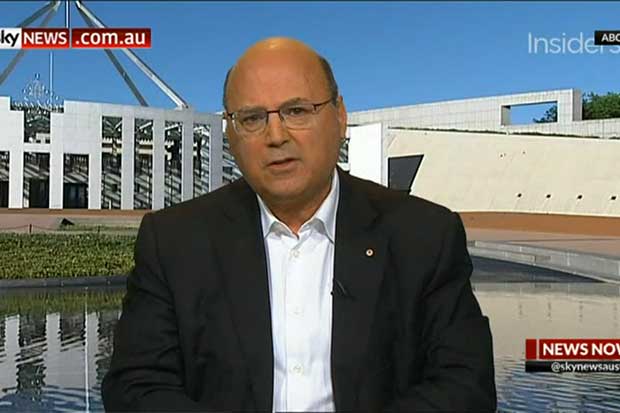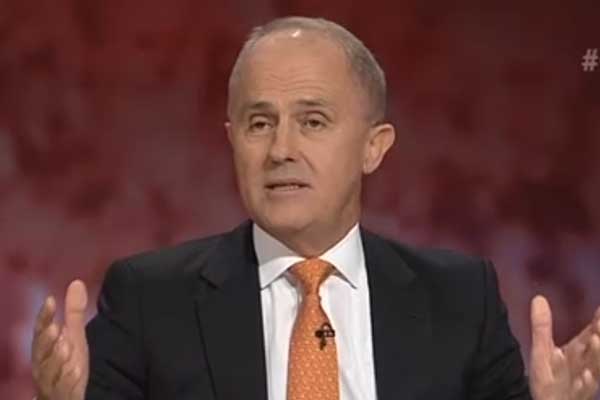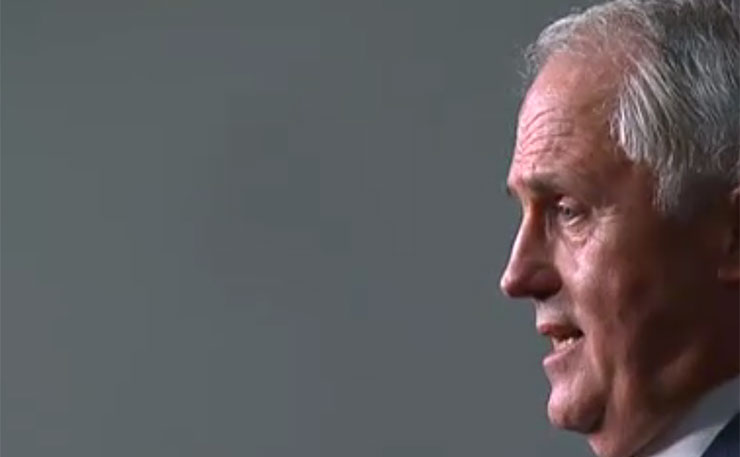Amidst the tumult of the Federal Cabinet overhaul yesterday a subtle new change in the government’s language around the environment and climate change solidified some, as Malcolm Turnbull apparently positions to depart from the pro-development cronyism that was the hallmark of Abbott’s administration.
Turnbull’s key backer, former chief-of-staff to John Howard, Arthur Sinodinos has led the way in shifting the Coalition from Abbott’s ideological obsession with mines, roads and overtly attacking the poor to raise revenue. On Sunday morning, he appeared on the ABC program Insiders to continue to foreshadow a less ideological approach to idealising the free market (see below).
While the Abbott government consistently turned the razor gang to the environment, and even started trying to make bogeymen of conservationists, Turnbull was turfed as opposition leader in 2009 for his support for an emissions trading scheme.
In his ascension to power, much of our new Prime Minister’s integrity on those issues has been sacrificed to the Liberal Party’s right wing. More troublingly, the minor partner in the Coalition managed to extract a promise that the embarrassing climate targets negotiated through Abbott’s extreme conservative Cabinet would persist as long as the agreement between the two parties’ leaders does.
In fact, the only material step on environmental policy that has emerged since the leadership spill is a retrograde one, with National Party Deputy Leader Barnaby Joyce acquiring responsibility for water, and, crucially, the administration of a much-vaunted plan to restore the Murray Darling Basin.
Although he will persist with many of the Abbott Government’s nasty and punitive policies, Turnbull is much more canny, and undeniably more complex, than his predecessor. He has learned some patience during his six years in the leadership wilderness.
There are some things Turnbull can do that will not rock the boat to the point of capsizing, and it’s too early to say whether he will or won’t ease the attacks on the environment.
When he announced his challenge a week ago, Turnbull framed his pitch around the “need to have in this country… an economic vision, a leadership that explains the great economic opportunities and challenges we face”.
Sinodinos has been a crucial sounding board for Turnbull, and he touched again yesterday on the need to transition away from blind dependence on big mining, now that the mining boom is over and the global markets for our two biggest exports, coal and iron ore, have collapsed around our ears.

“There’s a big transition ahead, we’ve got to get it right and we also need a Prime Minister who exudes hope and optimism about our capacity as a country to meet those challenges,” Sinodinos said.
“In relation to climate change, there was an agreement – and Malcolm was part of the Cabinet in that regard – around the targets, post 2020, but I think you’ll see that there’ll be a bit of an end to the idea that the environment and development have to be at loggerheads, that somehow it’s a zero-sum game.
“It’s not: Good environmental policies can also be good economic policies and good economic policies give you a capacity to deal with environmental issues.
“And so I don’t think we should be hung up on… the battles of 2009, or whatever, and also to accept that existing resources, as well as renewables, have their place, forgive the pun, in the sun.
“We don’t want to crimp the expansion of [renewable energy]industries,” he said.
He claimed the government he’s been key to setting up is “about having as many industries as we can get that are as competitive as possible and generate as many jobs as possible”.
New Matilda readers will remember the more than 2,500 jobs lost in the renewables sector as investment in clean energy plunged by 90 per cent under Abbott.
Sinodinos has been rewarded with a promotion to Cabinet Secretary, which means he will have his finger in many policy pies as he works across portfolios and tries to talk down the many spooked horses that are, already quite obviously, whinnying in Turnbull’s new-look stables.
For his part, the Prime Minister has been vague on how exactly his government will “recognise that the disruption that we see driven by technology, the volatility in change, is our friend if we are agile and smart enough to take advantage of it”.
His language on resources has been particularly beige, but Turnbull did make one rather lengthy detour during his press conference yesterday. It, too, seemed squarely aimed at the ideological dogmatism which denuded the Abbott government of its credibility as it stalked environmental groups, seeking to strangle them.
Greg Hunt will, much to the dismay of the environmentalists he’s pursued for years, stay on as Environment Minister. But Turnbull is appointing South Australian MP Jamie Briggs as the new Minister for Cities and the Built Environment, a posting that will fall within the broader Ministry of Environment.
Whereas the Abbott government would only stump up cash for massive, and ill-conceived, new motorways – think East West Link – ‘modern Malcolm’ was at great pains to point out “there is no place for ideology here at all”.
“Infrastructure should be assessed objectively and rationally on its merits,” he said.
“We shouldn’t be discriminating between one form of transit and another… roads are not better than mass transit or vice versa, each of them has their place.”

Like Sinodinos on renewables, Turnbull ultimately deferred to the market – “productivity”, “efficiency”, etc – with a little prudent intervention thrown in to encourage activity in sectors of the economy that will keep us ahead of the curve.
Turnbull would be well aware we are sailing into what will undoubtedly be shaky economic waters over the next decade. Of course, while mass transit is highly efficient, if you think about it, transport also happens to make up 16 per cent of Australia’s emissions. Mostly in the cities.
It’s a key example of where Turnbull can address the climate without ‘lifting the targets’, and stimulate the economy at the same time through the Federal investment Abbott refused to pour into mass transit.
Tony Abbott’s obsession with ‘green tape’, huge new roads in the cities, and coal being good for humanity was far beyond any rational analysis of productive impacts on the economy, and rationality is at the centre of Turnbull’s claim to economic management.
It is worrying that the new PM has chosen to roll Energy, Resources and Northern Australia into one Ministry, to be headed up by former Assistant Treasurer Josh Frydenberg, given the now-deposed Treasurer Joe Hockey had made no bones about his budding plan to subsidise massive new coal mines in the Galilee Basin.
Whether he continues to defend such environmentally destructive projects, which may not even be bankable, will be as much a test for Turnbull’s ‘progressive’ tendencies – the traits that enamor him to the many centrist voters who despised Abbott – as to whether he calls off the various attacks on green groups, bodies and legislation that Abbott leaves as his legacy.
Still, after years of cynicism it’s tempting to feel some hope as the calibre of the conversation lifts.
Amongst Turnbull’s first words last week when he announced he would challenge were the following gems: “The Australia of the future has to be a nation that is agile, that is innovative, that is creative. We can’t be defensive, we can’t future-proof ourselves.”
Yesterday, he was sanguine about possible policy changes, observing “there is a disconnect sometimes between the political discussion and the real world, where any change to a policy is seen as a backdown”.
Certainly, under Abbott, the discussion on the rapid degradation of our environment departed the real world. With the prospect of a second term of conservative government now more likely, it’s worth affording Turnbull some credit for a few months, to keep an eye out for an agenda that will be gentle on those that installed him, and an electorate pock-marked with years of negativity.
Donate To New Matilda
New Matilda is a small, independent media outlet. We survive through reader contributions, and never losing a lawsuit. If you got something from this article, giving something back helps us to continue speaking truth to power. Every little bit counts.




